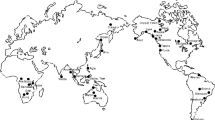Abstract
Some naturalists feel an affinity with some religions, or with a particular religion. They may have previously belonged to it, and/or been raised in it, and/or be close to people who belong to it, and/or simply feel attracted to its practices, texts and traditions. This raises the question of whether and to what extent a naturalist can lead the life of a religious believer. The sparse literature on this topic focuses on (a position recognizable as) religious fictionalism. I also frame the debate in these terms. I ask what religious fictionalism might amount to, reject some possible versions of it and endorse a different one. I then examine the existing proposals, by Robin Le Poidevin, Peter Lipton, Andrew Eshleman and Howard Wettstein, and show that even on my version of religious fictionalism, much of what has been described by these authors is still possible.
Similar content being viewed by others
Notes
It’s an interesting question whether descriptive fictionalism is defensible for some religious communities, and if so for which. Of course, if the doubts about non-doxastic acceptance I’ll express below are justified, this version of descriptive (religious) fictionalism can’t be correct. But a descriptive version of religious fictionalism as outlined in the section “Religious make-believe” below may well be, for (some members of) some communities.
See e.g. Miller (2012) for a discussion of these positions for the case of religion.
The following two paragraphs outline concerns raised in Szabó (2011).
This reply is in line with some of Howard Wettstein’s commitments (see below).
I owe this example to Christopher Jay, who (I think) mentioned it in a talk on this topic.
Of course, other things of value may be gained. Le Poidevin suggests that if theism is false, then the effect of theistic belief on one’s spiritual life may in part be a negative one (Le Poidevin 1996, p. 120).
Le Poidevin sometimes claims that theistic discourse isn’t truth-apt (cf Harrison 2010). Jay notes that this isn’t in line with what other religious fictionalists, and fictionalists in other areas think, and suggests it may be due to conflating not being truth-normed with not being truth-apt (or assuming an entailment from the former to the latter) (Jay 2014, p. 209).
Some passages suggest that what’s hardly articulable isn’t the nature of God, but rather that of the state one aspires to when imitating God: ‘This aspiration does not require that God exist, but it does require a conception of God, i.e. a representation of a perfected state of being.’ (Eshleman 2005, p. 192) But this ‘i.e.’ is problematic if, like Eshleman, one takes ordinary talk of God to be about a purported divine being.
He sometimes describes these as expressivist functions, but I don’t think expressivism is what’s at issue, either as a descriptive or a prescriptive view.
See footnote 1.
Thanks to an anonymous referee for raising this objection.
(Le Poidevin 1996, p. 120).
Thanks to an anonymous referee for raising this objection.
References
Alston, W. (1996). Belief, acceptance, and religious faith. In J. Jordan & D. Howard-Snyder (Eds.), Faith, freedom, and rationality: Philosophy of religion today. London: Rowman & Littlefield.
Audi, R. (2011). Rationality and religious commitment. Oxford: Oxford University Press.
Cordry, B. (2010). A critique of religious fictionalism. Religious Studies, 46(1), 77–89.
Dumitriu, P. (1979). Au Dieu Inconnu, page reference to translation by J. Kirkup (1982), to the unknown god. New York: Seabury Press.
Eshleman, A. (2005). Can an atheist believe in god? Religious Studies, 41(2), 183–199.
Eshleman, A. (2010). Religious fictionalism defended: Reply to Cordry. Religious Studies, 46(1), 91–96.
Harrison, V. (2010). Philosophy of religion, fictionalism, and religious diversity. International Journal for Philosophy of Religion, 68(1), 43–58.
Holley, D. (2010). Treating God’s existence as an explanatory hypothesis. American Philosophical Quarterly, 47(4), 377–388.
Howard-Snyder, D. (2013). Propositional faith: What it is and what it is not. American Philosophical Quarterly, 50(4), 357–372.
Jay, C. (2014). The Kantian moral hazard argument for religious fictionalism. International Journal for Philosophy of Religion, 75(3), 207–232.
Joyce, R. (2001). The Myth of morality. Cambridge: Cambridge University Press.
Le Poidevin, R. (1996). ‘Is god a fiction?’ In his arguing for atheism: An introduction to the philosophy of religion. London: Routledge.
Le Poidevin, R. (2003). Theistic discourse and fictional truth. Revue internationale de philosophie, 3(225), 271–284.
Lipton, P. (2007). Science and religion: The immersion solution. In Moore (Ed.), Realism and religion: philosophical and theological perspectives. Ashgate: Andrew & Scott, Michael.
Miller, C. (2012). Atheism and the benefits of theistic belief. In J. Kvanvig (Ed.), Oxford studies in philosophy of religion (pp. 97–125). Oxford: Oxford University Press.
Schellenberg, J. (2009). The will to imagine: A justification of skeptical religion. Ithaca: Cornell University Press.
Szabó, Z. (2011). Critical study of Mark Eli Kalderon (ed.) fictionalism in metaphysics. Nous, 45(2), 375–385.
Wettstein, H. (2012). The significance of religious experience. Oxford: Oxford University Press.
Wettstein, H. (2014). Interview with Gary Gutting in the NY Times, ‘Is belief a Jewish notion?’. Available online http://opinionator.blogs.nytimes.com/2014/03/30/is-belief-a-jewish-notion/?_r=0.
Acknowledgements
Thanks to the Notre Dame Center for Philosophy of Religion, the Templeton World Charity Foundation, and all who commented on earlier drafts, including Arif Ahmed, Alison Fernandez, Mike Rea, Evan Fales, and Robert Audi.
Author information
Authors and Affiliations
Corresponding author
Rights and permissions
About this article
Cite this article
Deng, N. Religion for naturalists. Int J Philos Relig 78, 195–214 (2015). https://doi.org/10.1007/s11153-015-9529-y
Received:
Accepted:
Published:
Issue Date:
DOI: https://doi.org/10.1007/s11153-015-9529-y




